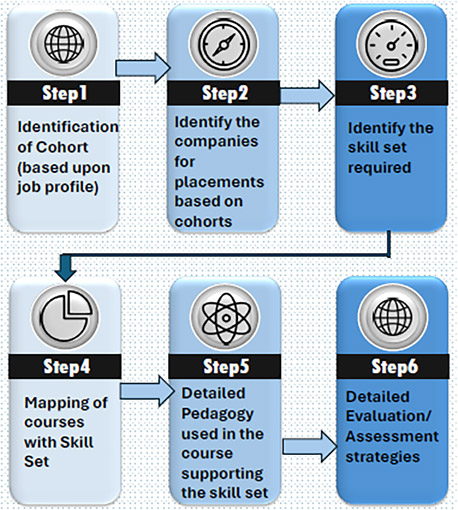Identification of Cohorts and Career Pathways
Lovely Professional University, in its continuous effort to provide students with comprehensive insights into the career paths available upon completing their respective academic programs, has introduced an innovative initiative for identifying cohorts associated with each program. A cohort, in this context, refers to a collection of career profiles that share common activities, and these are pivotal in helping students select and pursue the most suitable career paths.
At the outset of their program, students are introduced to the cohort areas relevant to their specific course of study. They are encouraged to explore these areas and identify the ones that align with their interests and aspirations. The concept of cohorts plays a vital role in offering students structured guidance for navigating the intricate landscape of career choices. It serves as an indispensable compass, aiding students in making informed decisions about their professional futures.
One of the key advantages of cohorts lies in their ability to connect students with like-minded peers who share similar interests, passions, and career objectives. This sense of belonging and companionship can be profoundly motivating and reassuring for students who may find themselves uncertain about the path they wish to pursue. Cohorts create a supportive community where students can freely exchange ideas, seek advice, and even collaborate on projects related to their chosen fields.
The beauty of this approach is that students are granted the freedom to select cohorts that resonate with their personal aspirations and career goals. This empowering choice allows them to take charge of their education, ensuring that they engage with subjects and activities that genuinely captivate their interest. When students are passionate about their chosen cohorts, they tend to exhibit higher levels of motivation, commitment, and proactiveness throughout their educational journey.
To facilitate this selection process, teachers are actively involved in providing guidance, information, and an array of options. This comprehensive support enables students to make well-informed decisions regarding the cohorts they wish to join. Consequently, the teaching methodology is meticulously tailored to cater to the unique needs and interests of each cohort.
An important facet of this personalized approach involves the identification of skill gaps, followed by the development of innovative pedagogies designed to address these gaps. Teaching and learning strategies are adeptly improvised based on the students' interests, which further enhances the educational experience.
This tailored approach not only fosters deeper engagement with the subject matter but also equips students with the specific skills and competencies required in their chosen careers. It bridges the gap between theoretical knowledge and practical application, ensuring that students are well-prepared to excel in their future professions.
Across a diverse array of academic programs, students have enthusiastically embraced the concept of cohorts. Initially, a total of 129 programs were selected for cohort identification, a testament to the widespread applicability of this model. Impressively, 11,841 students have actively participated in the identification of cohort areas, underscoring the high level of student engagement in this initiative.
Students have taken their commitment a step further by creating Gantt charts and resumes tailored to their chosen career profiles. Some have even proactively established an online presence by linking themselves on various social media platforms, such as LinkedIn, as early as their first year of their program.
In essence, cohorts serve as a dynamic and supportive platform that empowers students to explore their interests, collaborate with like-minded peers, and ultimately embark on fulfilling careers that align with their passions and goals. Within the realm of teaching practice, cohorts represent an invaluable tool for educators. They provide a means to inspire, guide, and equip the next generation of professionals, ensuring that they are not only knowledgeable but also well-prepared for the practical demands of their chosen fields. This approach reflects a forward-thinking, student-centric approach to education that fosters a culture of engagement, collaboration, and proactive career development.
The Process from Selection to the Implementation of Cohorts






 Whatsapp
Whatsapp